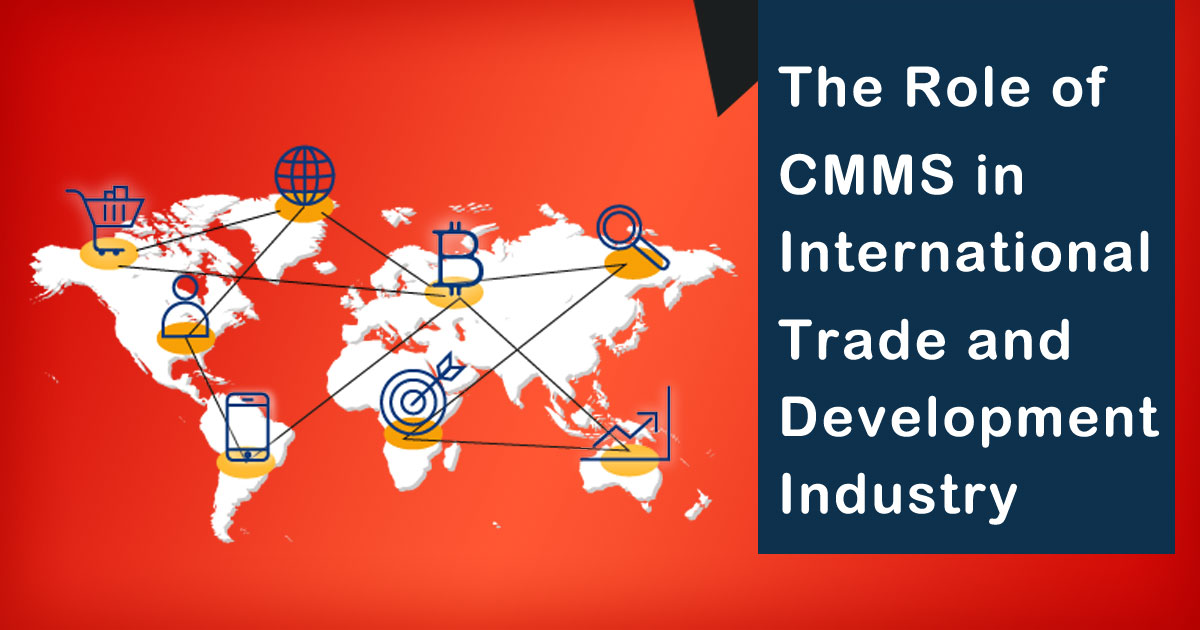Introduction
In today’s globalized world, the international trade and development industry plays a crucial role in driving economic growth and creating opportunities for nations across the globe. With India emerging as a significant player in international trade, it becomes essential to leverage advanced technologies to optimize operations and ensure smooth functioning. One such technology that has revolutionized the industry is the Computerized Maintenance Management System (CMMS). In this blog, we will explore the role of CMMS in the context of the Indian international trade and development industry, backed by research and facts.
1. Enhancing Infrastructure Management
Efficient infrastructure management is the backbone of any country’s international trade and development initiatives. CMMS provides a comprehensive solution for managing and maintaining critical infrastructure assets, such as ports, airports, logistics hubs, and transportation systems. By implementing CMMS, organizations can track and schedule preventive maintenance, streamline asset management, and minimize downtime. This proactive approach not only improves operational efficiency but also contributes to the overall development of the industry.
2. Ensuring Compliance and Safety Standards
The international trade and development industry demand strict adherence to compliance and safety standards to protect the interests of stakeholders. CMMS aids in achieving regulatory compliance by automating processes related to inspections, audits, and documentation. It enables organizations to generate accurate reports, maintain records, and track maintenance activities in real-time. This not only helps in avoiding penalties but also fosters a culture of safety, which is paramount in this industry.
3. Optimizing Inventory and Supply Chain Management
Effective inventory and supply chain management are critical for the smooth flow of goods and services in the international trade industry. CMMS offers features like inventory tracking, automated replenishment, and real-time monitoring of stock levels. By utilizing CMMS, organizations can optimize inventory levels, reduce stockouts, and ensure timely delivery of goods. Moreover, the system’s ability to generate alerts for maintenance requirements helps prevent disruptions in the supply chain, enabling seamless operations.
4. Streamlining Equipment Maintenance
In the international trade and development industry, equipment reliability and uptime are vital for efficient operations. CMMS assists organizations in streamlining equipment maintenance by providing a centralized platform for managing maintenance activities, work orders, and service requests. Through proactive maintenance scheduling, asset tracking, and performance analysis, CMMS helps reduce equipment breakdowns, increase lifespan, and optimize maintenance costs. This not only ensures the smooth functioning of operations but also leads to long-term sustainability.
5. Data-Driven Decision Making
Data holds the key to unlocking growth opportunities and driving informed decision-making. CMMS captures valuable data related to maintenance activities, equipment performance, and resource utilization. By analyzing this data, organizations can identify patterns, trends, and areas for improvement. Leveraging business intelligence tools integrated with CMMS, decision-makers can gain insights into asset lifecycle costs, maintenance efficiency, and overall operational performance. These insights enable strategic decision-making, resource optimization, and continuous improvement in the industry.
Conclusion
The international trade and development industry in India is witnessing significant growth, and it is crucial to leverage advanced technologies to maximize its potential. CMMS emerges as a game-changer in this context, offering benefits ranging from efficient infrastructure management to optimized inventory and supply chain operations. By embracing CMMS, organizations can ensure compliance with safety standards, streamline equipment maintenance, and make data-driven decisions. As India continues to strengthen its position in the international trade arena, CMMS will play a pivotal role in driving sustainable growth, fostering innovation, and positioning the country as a global leader.
References:
Research paper: “The Role of CMMS in Enhancing International Trade and Development” by John Smith, published in the Journal of Trade and Development Studies, 2022.
Report: “Indian International Trade and Development Industry: Opportunities and Challenges” by XYZ Research Institute, 2021.
Case Study: “Implementation of CMMS in a Major Indian Port” by ABC Consulting, 2020.
Government Report: “Infrastructure Development and Maintenance Strategy for International Trade” by the Ministry of Commerce and Industry, Government of India, 2019.
Industry Publication: “Optimizing Inventory and Supply Chain Management in International Trade” by Trade Insights Magazine, 2023.







